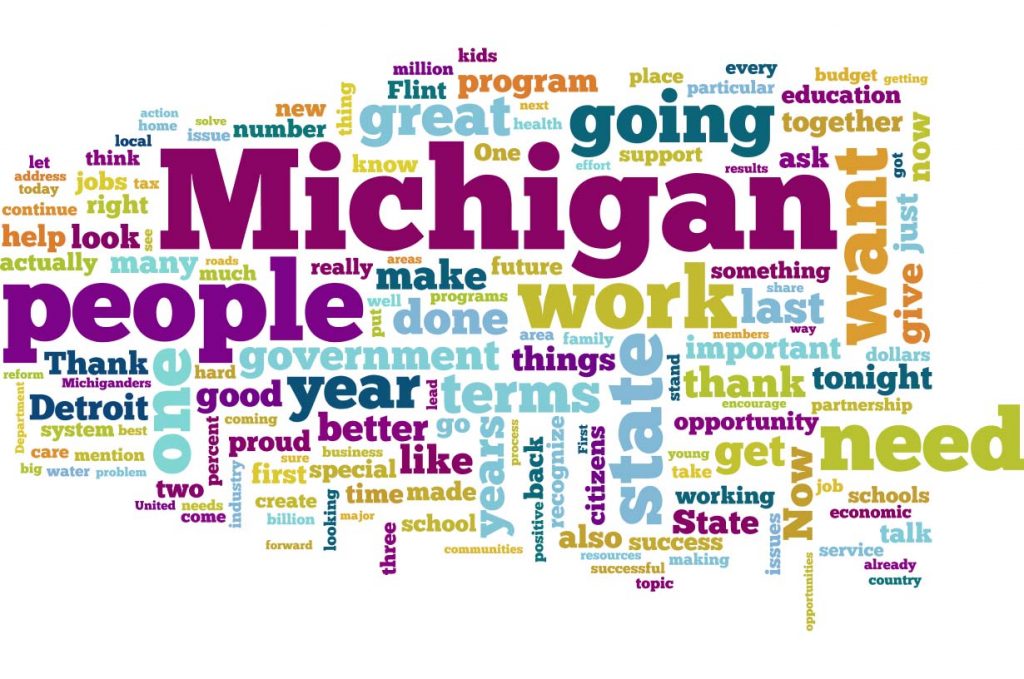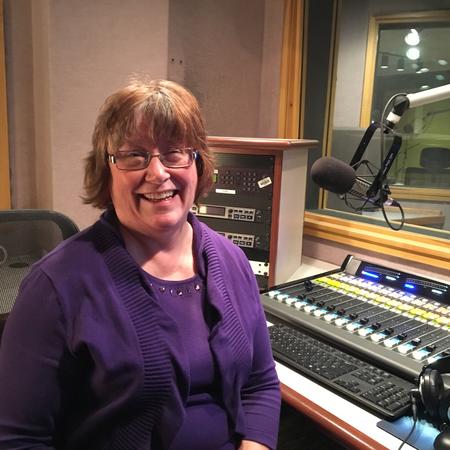State of the States: Snyder’s Words [CHARTS, INTERVIEW]
What’s the “Nerd”, with his “STEM” background, said re: “Great Lakes,” “Education,” “Dashboards,” “Detroit” and “Autos”?

As Michigan waits for Gov. Rick Snyder’s State of the State speech Tuesday evening, WDET wanted to know just what he’s talked about in his previous addressses. After all, he’s given six of them: one just a few weeks after he took office in 2011, one only two months before he appointed Kevyn Orr as Detroit’s emergency manager, and last year’s as the world learned what the people of Flint had known for months about the city’s water.
So we took the full text of his speeches, as transcribed in the Michigan House Journal, and did some analysis. We tracked how many words he has spoken in each speech — see below – which peaked in 2014 and has fallen since then. (Click on the bar to see just how many words he used each year.)
We looked at what he’s said about the auto industry. We ran the full text of all six years through a program that creates a “Word Cloud” — that’s the thumbnail picture at the top of this post. (Clearly “Michigan” is the most popular word in these speeches).
We picked certain words that relate to some of Michigan’s most important issues and industries, Detroit’s “news” of the last few years including bankruptcy and education, and the governor’s own often-used words related to analytics and metrics.
You can explore below what we found. Click on the colored bar of each graph to see a year-by-year chart of how many times he said each word.
If you want to see the full text of each speech, click here for our library of them.
We also did not rely just on our own analysis. We talked with Lee Wilkins, chair of the communication department at Wayne State University, about Snyder’s speeches. Here’s the full text of our conversation with Wilkins along with WDET’s informational graphics of what Snyder has talked about through the years.
You can listen to that conversation by clicking on the audio link above.
Here’s a full transcript of what she said:

Sandra Svoboda: What’s Gov. Snyder been like in his previous State of the State addresses?
Lee Wilkins: I think most people in Michigan would agree that Gov. Snyder is not a knock-your-socks-off kind of orator. He tends to be pretty plain-spoken and pretty straightforward. His State of the State messages are usually quite positive, even when there are some problems. One of the things he’s trying to do is to reassure people that Michigan is on the right track.
SS: WDET dug into the text of his previous six addresses. We looked at some of the words he used and some of the message that he had in those. What’s your reaction to some of those findings?
Click on the bar to see a year-by-year analysis of how many times Snyder mentioned the term during his speech.
LW: I think some of them are really interesting so let me talk about one. One of the things that WDET content analyzed for was his use of the term “auto” and “auto industry” in all of these speeches. What happens is in his very first speech, he never mentioned it. Then he mentioned it. Then he said he was concerned about it. Then he said he’d gone to the Auto Show. Then he finally winds up encouraging people to go. So that’s a place where just in the use of that one phrase you can see a progression in how he’s thinking about things.
Click on the bar to see a year-by-year analysis of how many times Snyder mentioned the term during his speech.
SS: In looking at other words he’s used and not used in the speeches, we’ve seen a change in him addressing education and schools.
LW: Yes, again, this is one of those places where you can see a real increase in the number of mentions. And I want to emphasize that number of mentions in and of itself is not horribly significant, it’s the context in which these things are mentioned. There’s a lot of issues tied up when we talk about education. What the progression of his speeches show, is he starts out mentioning the word very few times, basically single digits. Now in the most recent ones, we’re close to 20 mentions of just the word education. If you combine that with schools, we’re over 20 mentions.
Click on the bar to see a year-by-year analysis of how many times Snyder mentioned the term during his speech.
SS: What do you take from how he’s addressed Detroit and the bankruptcy and the financial situation here in the city?
LW: I think those are intriguing because again, going back to one of the purposes of the speech for any governor, not just for Gov. Snyder, is to be more positive than negative. You put “Detroit” and “bankruptcy” together and that’s pretty negative no matter how you want to look at it. The result is is that he mentions bankruptcy not just for Detroit but bankruptcy at all, very, very little even though we know Detroit is not the only city in Michigan or the only governmental agency to face this sort of thing. He mentions Detroit but he doesn’t mention Detroit a lot until the last two years.
Click on the bar to see a year-by-year analysis of how many times Snyder mentioned the term during his speech.
SS: When we look at the words of his speeches, we don’t necessarily see some of the trademark words we associate with Gov. Snyder. We don’t see “nerd” at all, we don’t see “dashboard” very much lately. We don’t see STEM. Why are those words perhaps not as prevalent in his speeches as they are in his presence?
Click on the bar to see a year-by-year analysis of how many times Snyder mentioned the term during his speech.
LW: I think maybe it’s a little bit too much geek. You’ve got to realize that this is for a general audience. A State of the State message is not just intended for the people in the room, it’s intended for the people who are going to hear it on WDET. They’re going to see snippets of it on the web. It may be simulcast. It certainly will be captured in print form for people to look at later on. So those words, even though they’re associated with Snyder, I think don’t sort of capture the tone of what it is he wants to set. They may be a little too much slang, or a little too much insider baseball.
WDET Intern Clara Ruffin contributed to this report.
